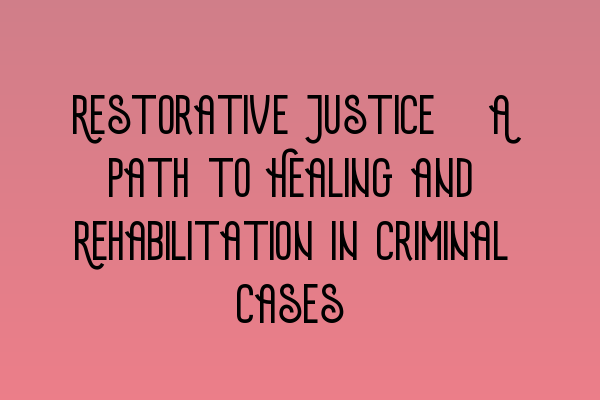Restorative Justice: A Path to Healing and Rehabilitation in Criminal Cases
When it comes to criminal cases, traditional approaches often focus solely on punishment and deterrence. While these punitive measures have their place in the justice system, there is an alternative approach gaining recognition for its positive impact on both victims and offenders: restorative justice.
Restorative justice is a process that aims to promote healing and rehabilitation by bringing together the victim, offender, and community. It provides an opportunity for all parties involved to openly communicate, express their feelings, and work towards resolution and reconciliation.
What is Restorative Justice?
Restorative justice focuses on repairing the harm caused by the offense rather than simply punishing the offender. Instead of a traditional courtroom setting, restorative justice processes often take place in a more informal and inclusive environment, such as a circle or conference.
The process involves facilitated dialogue, where the victim and offender have an opportunity to share their experiences and perspectives. The goal is to foster understanding, empathy, and accountability. Through this process, both parties can begin to heal and move forward.
Benefits of Restorative Justice
Restorative justice offers numerous benefits over traditional punitive approaches. Firstly, it provides a safe and supportive space for victims to express their emotions and be heard. This empowerment can aid in the healing process and help victims regain a sense of control.
Secondly, restorative justice allows offenders to take responsibility for their actions and understand the impact they have had on others. By facing the consequences of their behavior and engaging in meaningful dialogue with the victim, offenders are more likely to develop empathy and make amends.
Thirdly, restorative justice promotes community involvement and awareness. By including the community in the process, it fosters a sense of shared responsibility and encourages active participation in healing and preventing future offenses.
Applying Restorative Justice in Criminal Cases
Restorative justice can be applied in a variety of criminal cases, ranging from minor offenses to more serious crimes. It is particularly effective in cases where the victim and offender have a pre-existing relationship, such as domestic violence or school-related incidents.
It is important to note that restorative justice does not replace the justice system or legal consequences. Instead, it complements them by providing an additional avenue for healing and rehabilitation. Victims still have the option to pursue legal actions while also participating in the restorative justice process.
Restorative justice requires skilled facilitators who can guide the dialogue and ensure a safe and respectful environment for all participants. These facilitators are often trained professionals or volunteers who understand the principles of restorative justice and the impact it can have.
Conclusion
Restorative justice offers a unique and powerful approach to criminal cases, focusing on healing, rehabilitation, and community involvement. By incorporating this approach into our justice system, we can foster empathy, understanding, and accountability, ultimately working towards a safer and more harmonious society.
If you are interested in learning more about criminal law and practice in the UK, check out our related articles:
